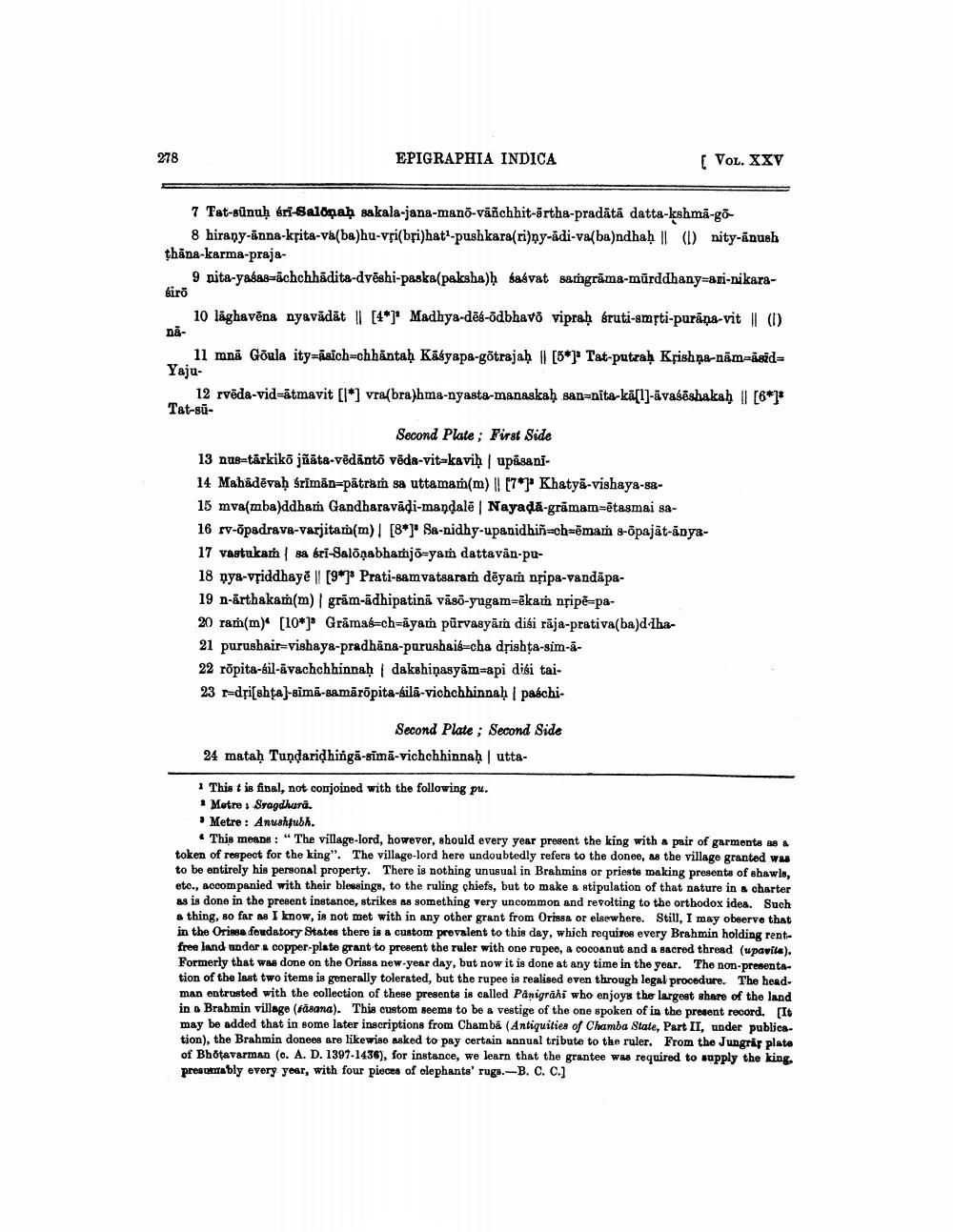________________
278
EPIGRAPHIA INDICA
[ Vol. XXV
7 Fat-sūnuḥ éri-Salona» sakala-jana-mano-vāñchhit-artha-pradātā datta-kshmă-go
8 hirany-anna-krita-va(ba)hu-vri(bri)hat-pushkara(ri)ny-adi-va/ba)ndhaḥ || (D) nity-anush thāna-karma-praja
9 nita-yasas=ichchhädita-dvēshi-paska(paksha)h balvat samgrāma-mūrddhany-ari-nikarabiro
10 läghavēna nyavādāt || [4*}* Madhya-dēs-õdbhavo vipraḥ śruti-smsti-purāņa-vit || (1)
Då
11 mnā Gõula ity=kaich=chhāntah Käsyapa-gotrajaḥ [5*]Tat-putza) Kţishņa-nām=asid= Yaju
12 rvēda-vid=ātmavit [l*] vra(bra)hma-nyasta-manaskah san=nita kā[l]-avašēshakah || [6*** Tat-su
Second Plate ; First Side 13 nus-tärkiko jñāta vēdānto vēda-vit-kavih upisani14 Mahadevah Srimān=pătram sa uttamam(m) ! (7Khatyā-vishaya-sa15 mva(mba)ddham Gandharavādi-mandalē | Nayadă-grāmam=ētasmai sa16 rv-opadrave-varjitam(m) [8*]* Sa-nidhy-upanidhiñ=ch=ēmam s-opajāt-anya17 vastukam sa sri-Salonabhamjo-yam dattavan-pu18 nya-vriddhayē | 19 Prati-samvatsaram dēyam nripa-vandāpa19 n-arthakam(m) grām-ādhipatinā vāső-yugam=ēkazh nripe-pa20 ram(m) [10*1* Grāmat=ch=āyam pūrvasyār disi raja-prativa(ba)d-ha21 purushair=vishaya-pradhana-parushais-cha dsishta-sim-.22 rõpita-sil-āvachchhinnah dakshiņasyām=api disi tai23 r-dri[shta)-simā-samārōpita-silā-vichchhinnaḥ | paschi
Second Plate ; Second Side 24 mataḥ Tundaridhińgā-sīmā-vichchhinnaḥ | utta
1 This t is final, not conjoined with the following pu. • Metre: Sragdhara.
Metre : Anushubh.
. This means : " The village-lord, however, should every year present the king with a pair of garments as a token of respect for the king". The village-lord here undoubtedly refers to the donee, as the village granted was to be entirely his personal property. There is nothing unusual in Brahmins or priests making presents of shawls, etc., accompanied with their blessings, to the ruling chiefs, but to make & stipulation of that nature in & charter ss is done in the present instance, strikes as something very uncommon and revolting to the orthodox idea. Such a thing, so far as I know, is not met with in any other grant from Orissa or elsewhere. Still, I may obeerve that in the Orissa feudatory States there is a custom prevalent to this day, which requires every Brahmin holding rentfree land under a copper-plate grant to present the ruler with one rupee, a cocoanut and a sacred thread (upavila). Formerly that was done on the Orisse new year day, but now it is done at any time in the year. The non-prenentation of the last two items is generally tolerated, but the rupee is realised even through legal procedure. The head. man entrusted with the collection of these presents is called Panigrahi who enjoys the largest share of the land in Brahmin village (Fasana). This custom seems to be a vestige of the one spoken of in the present record. (It may be added that in some later inscriptions from Chambă (Antiquities of Chamba State, Part II, under publication), the Brahmin donees are likewise asked to pay certain annual tribute to the ruler. From the Jungrar plata of Bhötavarman (c. A. D. 1397.1436), for instance, we learn that the grantee was required to supply the king presumably every year, with four pieces of elephants' rugs.-B. C. C.)




